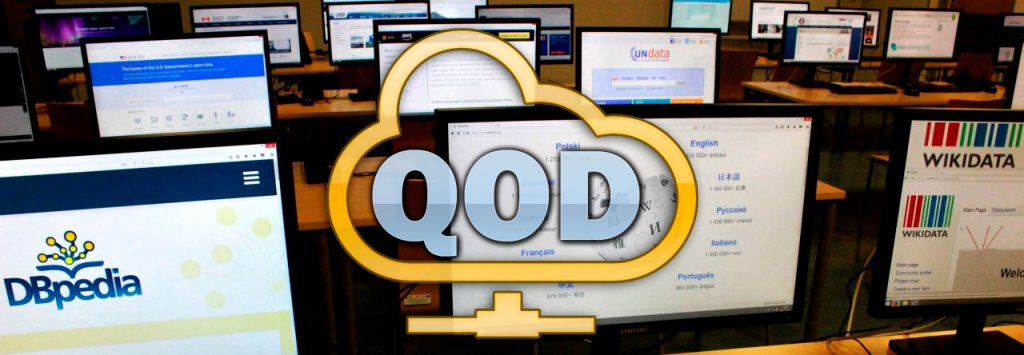| ← Workshops | QOD programme | QODW.org |
Topics of interest | Submission guidelines | Important dates | Organizers and Chairs | Program Committee
Accepted papers:
- ADEQUATe: A Community-driven Approach to Improve Open Data Quality
- Situation-dependent data quality analysis for geospatial data using Semantic technologies
- Indicating Studies’ Quality based on Open Data in Digital Libraries
- Syntactical Heuristics for the Open Data Quality Assessment and their applications
- Access Control and Quality Attributes of Open Data: Applications and Techniques
The goal of this workshop is to bring together different communities working on quality of information in Wikipedia, DBpedia, Wikidata and other open knowledge bases. The workshop calls for sharing research experience and knowledge related to quality assessment in open data. We invite papers that provide methodologies and techniques, which can help to verify and enrich various community based services in different languages.

Other editions of the workshop – QODW.org.
Topics of interest
- Quality management in open knowledge bases.
- Large-scale information extraction
- Multilingual entity recognition tasks
- Enriching open databases with NLP methods
- Quality assessment of Wikipedia articles
- Improving quality of DBpedia, Wikidata and other semantic databases
- Enrichment of multilingual open knowledge bases
- Analysis of references and citation data
Submission guidelines
- Long papers: max. 12 pages
- Work-in-progress reports: max. 6 pages
- Demo papers: max. 4 pages
Papers must be submitted in PDF format according to Springer LNBIP template
Submission system is available at EasyChair.
Papers approved for presentation at QOD 2018 will be published in BIS 2018 workshop post-conference proceedings, as a volume in Springer’s Lecture Notes in Business Information Processing (LNBIP) series. BIS 2018 Workshops proceedings will be distributed to workshop participants by regular mail.
Workshop papers will be made available in electronic form by the BIS organizers to all workshop participants (and only to them) directly before the conference.
Important dates
- June 3, 2018 (extended) – submission deadline for papers
- June 18, 2018 – notification of acceptance/rejection
- June 25, 2018 – submission of final papers (for presentation)
- July 18 or 19 or 20, 2018 – the workshop
Organizers and Chairs
Organizers
Chairs
- Dr. Amrapali Zaveri (Maastricht University, The Netherlands) is a postdoctoral researcher at Maastricht University in the newly established Institute of Data Science since January 2017. Previously, she was a postdoctoral researcher at Stanford University since September 2015. She completed her PhD from University of Leipzig, Germany in 2015. Her research interests include data quality, knowledge interlinking and fusion, biomedical and health care research. She conducted a comprehensive survey of the existing data quality assessment methodologies currently available to evaluate the quality of linked datasets. She has also been working on crowdsourcing methodologies for the assessment and improvement of Linked Data Quality as well as biomedical metadata quality.
- Dr. Krzysztof Węcel (Poznań University of Economics and Business, Poland) is a senior lecturer at Department of Information Systems. His main research interest is the intersection of semantic web technologies, open data, and machine learning. He has been involved in many EC-funded projects including a flagship project on linking open data – LOD2. He was a visiting scholar in leading research institutions in Europe, e.g. Leopold-Franzens University of Innsbruck and University of Karlsruhe, as well as emerging ones in Asia – Asian Intitute of Technology and Indian Institute of Technology.
- Włodzimierz Lewoniewski (Poznan University of Economics and Business, Poland) is a PhD student in the Department of Information Systems. Author of more than 10 publications related to quality assessment of information in multilingual open knowledge bases (such as Wikipedia, DBpedia and others). One of them got Best Paper Award in international conference. He develops various online web-services that allows automatically assess quality of information in Wikipedia.
Program Committee
- Maribel Acosta, Karlsruhe Institute of Technology, Germany
- Riccardo Albertoni, CNR-IMATI, Italy
- Wouter Beek, Vrije Universiteit Amsterdam, Netherlands
- Vittoria Cozza, University of Padua, Italy
- Quang-Vinh Dang, INRIA, France
- Anastasia Dimou, Ghent University, Belgium
- Suzanne Embury, The University of Manchester, United Kingdom
- Ralf-Christian Härting, Aalen University, Germany
- Antoine Isaac, Europeana & VU University Amsterdam, Netherlands
- Tomas Kliegr, University of Economics, Prague, Czech Republic
- Tomas Knap, Semantic Web Company, Austria
- Magnus Knuth, Leipzig University, Germany
- Elisabeth Lex, Graz University of Technology, Austria
- Shuangyan Liu, The Open University, United Kingdom
- Finn Årup Nielsen, Technical University of Denmark, Denmark
- Matteo Palmonari, University of Milano-Bicocca, Italy
- Simon Razniewski, Max Planck Institute for Informatics, Germany
- Anisa Rula, University of Milano-Bicocca, Italy
- Thomas Steiner, Google Germany GmbH, Hamburg, Germany
- Arjen de Vries, Radboud University, Netherlands
- Morten Warncke-Wang, Wikimedia Foundation
Contact
- E-mail: contact@qodw.org
